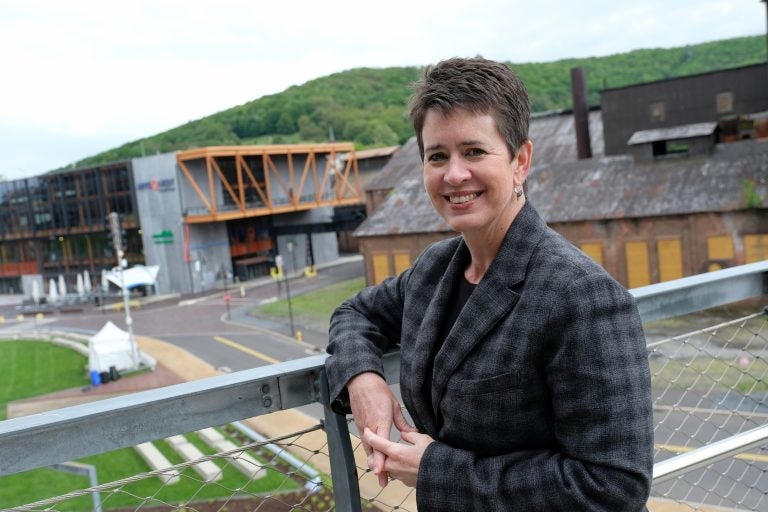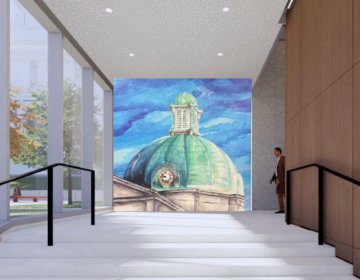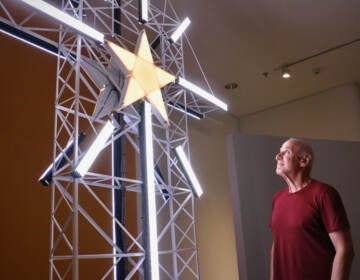Musikfest returns to Bethlehem as a 10-day hybrid of live and streaming concerts
As one of the largest free music festivals in the country, Musikfest attempts to recreate the street fair feel at home.
Listen 1:46
ArtsQuest President and CEO Kassie Hilgert stands on the SteelStacks campus, which sits at the base of the former blast furnaces of Bethlehem Steel. (Matt Smith for Keystone Crossroads)
One of the largest free, outdoor festivals in the country, Bethlehem, Pennsylvania’s Musikfest, normally attracts 1.2 million people over its 10 days. It brings about $77 million to the Lehigh Valley economy each year, according to Kassie Hilgert, CEO of ArtsQuest, which puts on Musikfest.
“We have 17 stages spread out over 60 acres across the city,” said Hilgert. The festival attracts people from 45 states and 26 countries.
That was before COVID-19.
This weekend, Musikfest launches for its typical 10 days of music, food, and crafts as a hybrid of online and in-person events. The music will be presented in three ways:
- As streaming, prerecorded performances by artists in their home studios, including headliners KT Tunstall, steel guitar player Robert Randolph, Adam Weiner of the band Low Cut Connie, and the rockabilly of the Reverend Horton Heat.
- As live concert broadcasts on cable TV from a soundstage at Service Electric, a cable TV provider in the Lehigh Valley, showcasing more local talent like the folk music of Dave Fry, the blues and soul of Slam Allen, and at least three polka bands.
- As in-person, outdoor dinner performances from the campus of SteelStacks, the former home of Bethlehem steel that was transformed into an entertainment complex, including the Craig Thatcher Band, Danielle Ponder, and the Hector Rosado Orchestra.
“Our campus can hold about 4,000 people in normal years. So we can safely have 250 people in two adjacent venues on campus,” said Hilgert, referring to the state mandate that limits large outdoor gatherings to 250 people.
This is the 36th year of the festival, which normally offers 16 of its 17 music stages for free. The economic impact of Musikfest comes mostly from food, craft vendors, hotels, restaurants, and ancillary costs of attending a festival. Those vendors are usually set up in various plazas, or “platzes” named in honor of Lehigh Valley’s German and Pennsylvania Dutch heritage: Americaplatz, Festplatz, Handwerkplatz, etc.
The festival is attempting to recreate the platz experience online, where merchants and craft activities will have a virtual presence. Participants are encouraged to get into the spirit of the festival by designating their own home as a “platz.”
“So my house will be Hilgertplatz,” said Hilgert. “We’re into our third generation of festival goers. Everyone owns a piece of this festival and has their own traditions. We are embracing them.”
“We thought it was vital to do something to keep our communities connected through the arts,” she said. “During this time more than ever, we need hope.”
People can also order from food vendors at the SteelStacks campus, but there will not be tables set up for eating. To promote social distancing, purchased food must be taken away to be consumed.
Since the statewide shutdown of live events in March, ArtsQuest has lost $19 million in revenue, according to Hilgert. The organization has laid off two-thirds of its staff. This summer’s Musikfest doubles as a fundraising campaign, with the goal of raising $1 for every person that would have attended in a normal year: about $1 million.
Hilgert hopes the online reach of Musikfest will expand awareness of the festival.
“We are going to hopefully get in front of people across the country and across the globe, who may say ‘What is this music fest? I want to see this in 2021,’” she said. “Another goal of ours is to keep Lehigh Valley positioned in front of people and their thoughts when we can travel again.”

Get daily updates from WHYY News!
WHYY is your source for fact-based, in-depth journalism and information. As a nonprofit organization, we rely on financial support from readers like you. Please give today.





